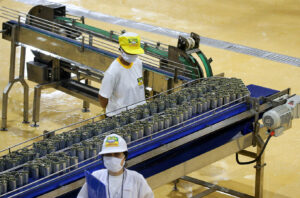MANUFACTURING OUTPUT contracted by 6.3% in September due to double-digit declines in the production of coke and refined petroleum products as well as in beverages, according to the Philippine Statistics Authority (PSA).
Preliminary results of the PSA’s Monthly Integrated Survey of Selected Industries indicated that factory production, as measured by the volume of production index (VoPI), declined 6.3% in September after having grown 1.2% in August. A year earlier, VoPI grew 9.5%.
Month on month, the manufacturing-sector VoPI fell 3.6% after having declined 0.9% in August.
The average manufacturing output growth for the nine months to September was 1%, slowing from 5.84% a year earlier.
The manufacture of coke and refined petroleum products, with a 12.8% annual decrement from 13.6% in August.
Also contributing to the slow growth in factory activity was the growth slowdown in the manufacture of beverages to 8.5% year on year from 12.4% in August, while basic metals declined 35.1% year on year in September from a decline of 18.4% in August.
Thirteen industry categories posted accelerating year-on-year growth in September, led by electrical equipment (49.4% in September from 32.2% in August); leather and related products, including footwear (28.8% from 22.4%); and furniture (25.3% from 15%).
Meanwhile, six industry categories posted declining growth led by the manufacture of wood, bamboo, cane, rattan articles and related products (-23.8% in September from a 59.7% increase in August). The decline in chemical and chemical products output accelerated to 10.3% in September from a 4.2% decline a month earlier.
September capacity utilization averaged 75.3%, against 75.4% in August. No industry category reported utilization of less than 60% during the month.
The top three industry categories for capacity utilization rates were machinery and equipment except electrical (82.9%), other manufacturing and repair and installation of machinery and equipment (80.8%), and furniture (80.3%).
Rizal Commercial Banking Corp. Chief Economist Michael L. Ricafort said the recent work suspensions due to typhoons disrupted manufacturing and damaged facilities.
“The storms also disrupted supply chains especially in agriculture, which reduced output and, in some cases, increased inflation, especially in hard-hit areas,” he said via Viber.
Factory output is expected to increase in the coming months ahead of the yearend holidays, Mr. Ricafort said.
“The expected signing into law of the CREATE MORE bill will also encourage more foreign direct investment and boost some of the manufacturing industries here that are part of global supply chains.”
Another gauge of manufacturing health, S&P Global’s Philippine Manufacturing Purchasing Managers’ Index (PMI), rose to 53.7 in September from 51.2 in August. It was the strongest PMI reading since the 53.8 posted in June 2022.
A PMI is a forward-looking indicator based on surveys of purchasing managers, who place raw-material orders based on their companies’ reading of near-term demand. A PMI reading above 50 points to expanding manufacturing activity once the raw-material orders arrive, while a reading below 50 indicates an impending contraction. — Beatriz Marie D. Cruz
